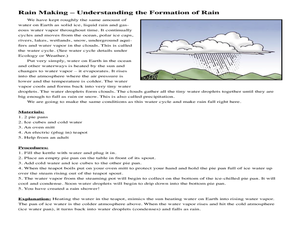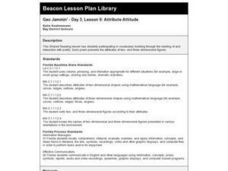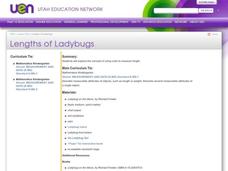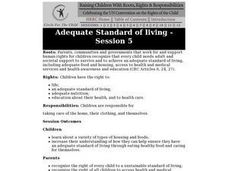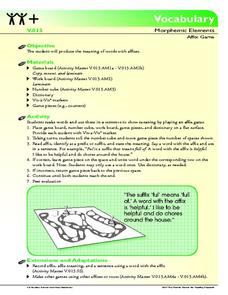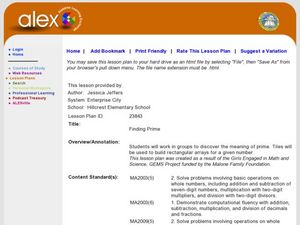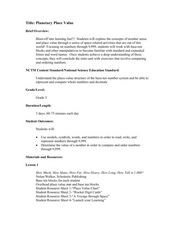Curated OER
I See a Rainbow
Students identify the different colors in a rainbow. They experiment with dropping food coloring into a water and then making ice cubes. They discuss what happens to the water in the freezer
Curated OER
Rain Making - Understanding the Formation of Rain
Students read and conduct and experiment to learn about rain formation. In this water forms lesson, students read about the formation of rain and its purposes. Students then complete a rain experiment activity.
Curated OER
Geo Jammin' - Day 3, Lesson 9: Attribute Attitude
Second graders read poetry and build their vocabulary through use of the puppet Geo George.
Curated OER
Structures
Students choose which building material to use to create their structure and which animal to house. After being read a story, they examine and identify the differnet types of homes mentioned. They take pictures of their structures...
Curated OER
Making Tangram Pieces by Folding Paper
Third graders follow directions to make a set of tangram pieces. After reading a story, they compare and contrast the differences between two-dimensional shapes. To end the lesson, they use the tangram pieces to create their own...
Curated OER
Math Maven's Mysteries
In these story problem worksheets, students read the story problem 'The Case of the Virtual Pet 2000' and use the information within the story to help them find which character had enough time to take the toy. Students use subtraction to...
Curated OER
Ozone Pollution: Smog Alert
Students simulate the development of smog. They discover how it forms naturally in nature. They read news articles about the ozone and pollution. They discuss what they can do to lower the pollution they generate.
Curated OER
Lengths of Ladybugs
Students are read a book about ladybugs. Using the test, they estimate which page shows the longest trip the ladybug made. They assemble their own ladybug book by following directions on a worksheet. They take measurements on each...
Curated OER
Adequate Standard of Living: Children's Rights
Students and parents participate in a variety of activities designed to explore the issue of every person's right to adequate housing. They make butter, make models of different types of housing, read books, discuss the rights and...
Curated OER
Make Words: Humpback Whale
In this language arts and science worksheet, students examine a picture of a humpback whale and read an informative paragraph. Students then make at least 28 words from the letters in "humpback whale."
Curated OER
Painting a Landscape
In this landscape painting worksheet, students follow the directions to create a picture of hills, a ploughed field, trees and hedges. There are no picture examples; students read the step by step instructions.
Curated OER
Problem Solving: Perimeter, Area, or Volume?
In this perimeter, area, or volume learning exercise, students read the word problems and determine whether to problem solve to find the perimeter, area, or volume to answer the six word problems.
Curated OER
Joining (Addition) & Separating (Subtraction) - Result Unknown
How much is the total? How many more is left? These basic questions are asked of students through two story problems that involve catching fish on a weekend fishing trip and goal of reading a certain number of books. Your learners will...
Curated OER
Mixed Addition and Subtraction Word Problems Two Version 1
In this word problems worksheet, students read the word problems and use addition or subtraction to solve the problems. Students solve 5 word problems.
Florida Center for Reading Research
Vocabulary Morphemic Elements: Affix Game
How well do you know your affixes? Find out how proficient your learners are with a game that requires them to define various affixes and use them to create words that will go into sentences.
Curated OER
Opening a Special Ed Class
This is not just a lesson plan, it's a life saver! Here are 10 separate documents intended to assist a new Special Ed teacher. There are 4 different games, instructional tips, ways to handle documentation, behavioral modification...
Curated OER
When Art's a Craft
What would it be like to restore modern works of art? By acting as modern art conservators, learners assess the first-hand difficulties faced in restoration efforts. In addition, they create modern art pieces from random materials. Then,...
Alabama Learning Exchange
Finding Prime
Fifth and sixth graders explore prime numbers. They work with a partner to build rectangular arrays using twelve tiles. Factor pairs are noted and recorded on graph paper. Pupils construct rectangular arrays with a prime number and...
Curated OER
Planetary Place Value
Third graders explore place value to the ten thousands place. This incredibly thorough, 24-page lesson has learners construct, order, and compare numbers to 9,999. This three-day lesson includes reteaching and extension activities...
National Math + Science Initative
Introduction to Decimals
Three activities make up an introductory lesson designed to create a strong foundation in comparing fractions to decimals and exploring and building decimal models. Pupils brainstorm and complete a Venn diagram to show how decimals and...
Mathed Up!
2D and 3D Shapes
What a great assessment to give young mathematicians in order to test their knowledge on two- and three-dimensional shapes. Learners name various shapes, identify the number of edges, faces, and vertices, match an unfolded version of a...
Roald Dahl
The Twits - The Monkeys Escape
Houses come in all shapes and sizes, but not all houses are safe from Mr. and Mrs. Twit. The 10th lesson in a unit designed to accompany The Twits by Roald Dahl turns learners into architects. While designing houses for the monkeys, they...
West Contra Costa Unified School District
Adding by finding 10's
Count with ten frames in a first grade addition lesson. Kids determine how to identify numbers on a number line, as well as with ten frames, and complete ten frames to show their answers in several addition problems.
Curated OER
I Have a Magic Pot
Pupils will explore numbers rules. They will create a picture of their rule and exchange their paper with a classmate. The classmate works to figure out the rule. They then share with each other how they found the rule. Questions are...



